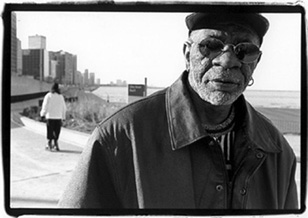Ronald Jones

Ronald Jones (Photo: Loren Santow)
Coerced confession put
Ronald Jones on death row
On March 10, 1985, a 28-year-old mother of three was raped and murdered in an abandoned motel on the south side of Chicago. Seven months later, Chicago Police Detectives Steven Hood and John Markham obtained a signed confession to the crime from Ronald Jones, a 34-year-old alcoholic who lived in the neighborhood where the crime occurred.
The detectives claimed the confession was voluntary, but Jones claimed he signed it because he had been beaten by Hood and Markham. Jones testified that Hood struck him in the head three or four times with a black object about six inches long before Markham said, "Don't hit him like this because he will bruise" and proceeded to punch Jones repeatedly in the stomach.
Although the confession was dubious — it asserted that the victim was a prostitute when in fact she had no history of prostitution — Cook County Circuit Court Judge John E. Morrissey held it admissible at Jones's 1989 trial. No physical evidence linked Jones to the crime, but the signed confession said Jones had ejaculated; the state claimed that semen recovered from the victim was too small a quantity to test. Jones was convicted by a jury and sentenced to death by Morrissey.
In 1994, Assistant Illinois Appellate Defender Richard Cunningham asked Morrissey to authorize DNA testing with technology that had not existed at the time of Jones's trial. Morrissey denied the request and, when reminded that prosecutors originally had contended Jones was the source of the semen recovered from the victim, snidely responded, "Save arguments like that for the press. They love it. I don't."
Cunningham enlisted attorney Gary O. Pritchard to work on an appeal to the Illinois Supreme Court, and based on their briefs, the Supreme Court reversed Morrissey, ordering the testing. In 1997, the DNA testing established conclusively that Jones was not the source of the semen recovered from the victim. Even then, prosecutors refused to abandon the case. They stalled Jones's release until, facing a retrial, they finally dropped all charges against him on May 17, 1999.
Case Summary (pdf)

